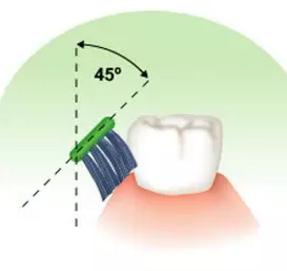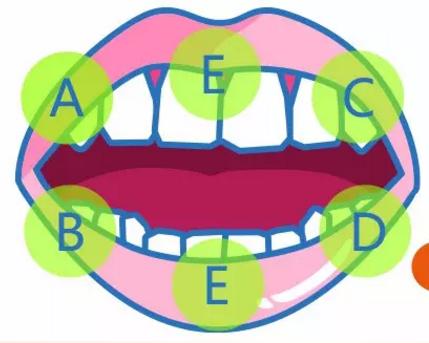The oral bacterial flora in each of us forms a sticky plaque that adheres to the surface of the teeth or the soft tissues of the mouth.
Bacteria will convert the ingested sugar-containing substances into acidic substances, and then damage the enamel on the tooth surface, gradually forming caries; or stimulate the gums to cause inflammation and form periodontal disease.
Caries and periodontal disease are the main causes of toothache or loose teeth. The longer plaque is in your mouth, the more damage it can cause.
Teeth appear to be clean, but visible plaque buildup after application of plaque stain.
To remove plaque, you can use a manual or electric toothbrush. No matter which toothbrush you use, the way you brush your teeth is very important.
We generally recommend the "Bath brushing method": make the bristles of the toothbrush form a 45-degree angle with the teeth, and vibrate slightly against the edge of the gums. Don't ignore hard-to-reach nooks and crannies, either.

Finally, the cleaning of the tongue surface cannot be ignored. Here are some tips for you: Choose a toothbrush with soft bristles and replace it regularly every 3-4 months.

Different Teeth Cleaning Methods
Because the teeth are in close proximity to each other, the adjacent surfaces of the teeth are generally difficult to clean with a toothbrush. If you want to clean thoroughly, you need to use dental floss together.
Don't panic if your gums bleed when you first start flossing, this will usually get better with regular flossing. If the bleeding doesn't get better, talk to your dentist as it could be an early sign of periodontal disease.
Sometimes, with the correct interdental brush or flosser, it can bring better cleaning results. But pay attention to how to use it: no matter what cleaning tool you use, don't exert too much pressure on your teeth or gums, so as not to cause unnecessary damage.
Also, mouthwash is a great addition, but it's not a complete replacement for toothbrush and water flosser. Different mouthwashes have different active ingredients and effects. Here is a tip for you: try not to use mouthwash immediately after brushing, or you may reduce the effectiveness of the toothpaste.
Having good oral health habits, combined with regular oral checkups, will benefit you throughout your life. Even if you don't feel any discomfort, regular dental check-ups are very important. Oral examination can effectively help us find diseases as early as possible, so as to treat them as soon as possible. Early detection and early treatment generally mean lower treatment costs.
If toothache or other symptoms have occurred, it indicates that the problem may have spread to the pulp or the tissue around the root tip of the tooth. At this time, root canal treatment or extraction may be needed to completely solve the problem. In this way, not only the treatment cost is higher, but also the process is more painful, and sometimes the prognosis is not ideal.
Before and After Periodontal Treatment
Regular scaling is also very important for periodontal health. Scaling does not cause loose teeth.
On the contrary, if there is too much calculus, it may stimulate the inflammation of the gums and the absorption of the alveolar bone, thereby causing periodontal disease, resulting in loosening or loss of teeth.
Post time: Feb-05-2023




